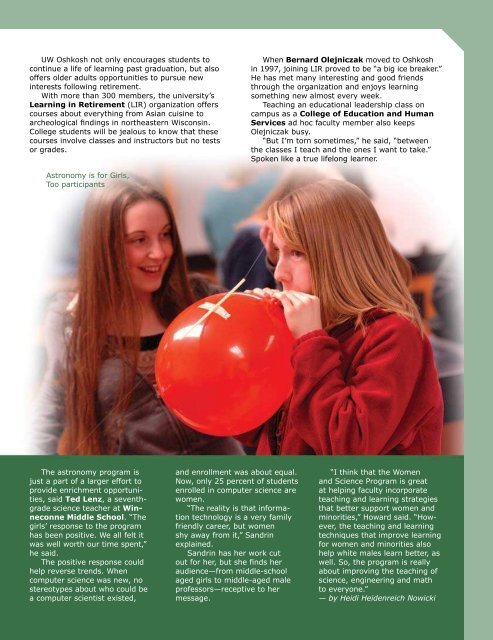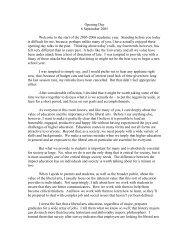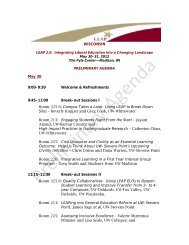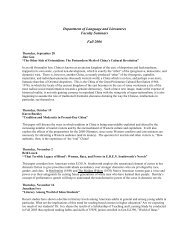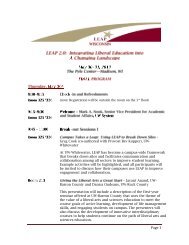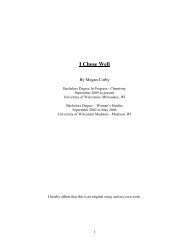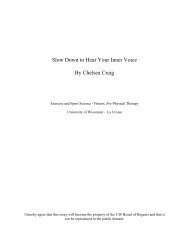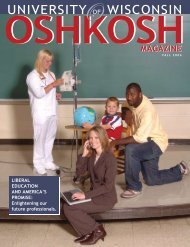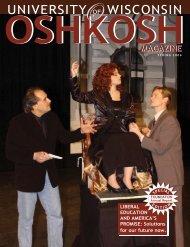UW-Oshkosh Magazine, Spring - Liberal Education Initiative
UW-Oshkosh Magazine, Spring - Liberal Education Initiative
UW-Oshkosh Magazine, Spring - Liberal Education Initiative
Create successful ePaper yourself
Turn your PDF publications into a flip-book with our unique Google optimized e-Paper software.
<strong>UW</strong> <strong>Oshkosh</strong> not only encourages students to<br />
continue a life of learning past graduation, but also<br />
offers older adults opportunities to pursue new<br />
interests following retirement.<br />
With more than 300 members, the university’s<br />
Learning in Retirement (LIR) organization offers<br />
courses about everything from Asian cuisine to<br />
archeological findings in northeastern Wisconsin.<br />
College students will be jealous to know that these<br />
courses involve classes and instructors but no tests<br />
or grades.<br />
Astronomy is for Girls,<br />
Too participants<br />
The astronomy program is<br />
just a part of a larger effort to<br />
provide enrichment opportunities,<br />
said Ted Lenz, a seventhgrade<br />
science teacher at Winneconne<br />
Middle School. “The<br />
girls’ response to the program<br />
has been positive. We all felt it<br />
was well worth our time spent,”<br />
he said.<br />
The positive response could<br />
help reverse trends. When<br />
computer science was new, no<br />
stereotypes about who could be<br />
a computer scientist existed,<br />
and enrollment was about equal.<br />
Now, only 25 percent of students<br />
enrolled in computer science are<br />
women.<br />
“The reality is that information<br />
technology is a very family<br />
friendly career, but women<br />
shy away from it,” Sandrin<br />
explained.<br />
Sandrin has her work cut<br />
out for her, but she finds her<br />
audience—from middle-school<br />
aged girls to middle-aged male<br />
professors—receptive to her<br />
message.<br />
When Bernard Olejniczak moved to <strong>Oshkosh</strong><br />
in 1997, joining LIR proved to be “a big ice breaker.”<br />
He has met many interesting and good friends<br />
through the organization and enjoys learning<br />
something new almost every week.<br />
Teaching an educational leadership class on<br />
campus as a College of <strong>Education</strong> and Human<br />
Services ad hoc faculty member also keeps<br />
Olejniczak busy.<br />
“But I’m torn sometimes,” he said, “between<br />
the classes I teach and the ones I want to take.”<br />
Spoken like a true lifelong learner.<br />
“I think that the Women<br />
and Science Program is great<br />
at helping faculty incorporate<br />
teaching and learning strategies<br />
that better support women and<br />
minorities,” Howard said. “However,<br />
the teaching and learning<br />
techniques that improve learning<br />
for women and minorities also<br />
help white males learn better, as<br />
well. So, the program is really<br />
about improving the teaching of<br />
science, engineering and math<br />
to everyone.”<br />
— by Heidi Heidenreich Nowicki<br />
Italian Interpreter<br />
Franca Barricelli, History Department Chair<br />
The worlds of faculty<br />
scholarship and<br />
regional business have<br />
converged in a number<br />
of interesting ways<br />
for Franca Barricelli,<br />
history department<br />
chair.<br />
Barricelli, whose<br />
specialty is Italian<br />
cultural history, is<br />
fluent in Italian and<br />
has tutored community members in Italian language and<br />
culture since the late 1990s. It was in this capacity that<br />
<strong>UW</strong> <strong>Oshkosh</strong>’s Center for Community Partnerships<br />
contacted her to serve as an Italian interpreter for an area<br />
business.<br />
The company was hosting a dozen businessmen from<br />
northern Italy. Since none of the visiting party spoke a<br />
word of English, Barricelli brought her expertise in Italian<br />
language and culture to unite the two groups.<br />
“It was a week of corporate jets, site visits, explaining<br />
the nuances of different business practices–a far cry from<br />
my daily routine at <strong>UW</strong> <strong>Oshkosh</strong>,” Barricelli said. “I<br />
even found myself on a quail hunt with them.”<br />
Her contributions helped the company expand its<br />
European operations in Italy.<br />
Barricelli’s role as one of the Fox Valley’s Italian<br />
experts has helped her secure the business prospects of<br />
others, too.<br />
She tutored a member of the Wisconsin Family<br />
Business Forum, whose interests in generational family<br />
activities led him to Italy. Unlike local family businesses,<br />
which may go back only two or three generations,<br />
Italian family-run companies can reach back centuries,<br />
providing a more time-tested model for family business<br />
practice.<br />
“Businesses recognize that we in the liberal arts can<br />
help provide the context for more informed decisions<br />
based on the integration of different cultural perspectives,”<br />
Barricelli said.<br />
Barricelli has been a fellow at the Institute for<br />
Research in the Humanities in Madison and a fellow<br />
at an N.E.H. Seminar in Cambridge, Mass. In 2004,<br />
she received the <strong>UW</strong> <strong>Oshkosh</strong> Distinguished Teaching<br />
Award.<br />
—Heidi Heidenreich Nowicki<br />
O<br />
<strong>UW</strong> OSHKOSH MAGAZINE<br />
People of Pride<br />
<strong>Liberal</strong> Artist<br />
John Koker, College of Letters and Science Interim Dean<br />
There’s nothing<br />
simple about John<br />
Koker. And there are<br />
no boundaries to his<br />
creative expression as<br />
math professor, dean<br />
and, yes, as an actor<br />
on stage.<br />
As an undergraduate<br />
at St. Norbert<br />
College, he participated<br />
in athletics and<br />
theatre while majoring in mathematics. Before his first<br />
play, his biggest concern was memorizing the lines.<br />
During the first class he taught as a new professor in<br />
1990 at what was then Potsdam College in New York,<br />
he lectured from note cards.<br />
Now, the lines are far less important than the creative<br />
development of the character in his plays. And to<br />
his classes, Koker brings things like cards and dice rather<br />
than note cards and leaves most of the talking to his<br />
students.<br />
“Theatre and mathematics are both creative fields,”<br />
Koker said. “The lines are just one tool an actor uses<br />
to develop the character. In math, you have to know<br />
the skills, but there’s so much more you can go on to<br />
through creative application of those skills.”<br />
That’s the essence of Koker’s work as an awardwinning<br />
math professor and chair at <strong>UW</strong> <strong>Oshkosh</strong>, and<br />
now as interim dean of the College of Letters and<br />
Science. He joined the <strong>UW</strong> <strong>Oshkosh</strong> math faculty in<br />
1991.<br />
“The wonderful thing about a campus with a strong<br />
liberal arts program like ours is that everyone gets the<br />
opportunity to appreciate a wide range of disciplines and<br />
ideas,” he said. “I think I became a better math professor<br />
and department chair because I was in some plays.”<br />
Koker won the <strong>UW</strong> System Regents Teaching<br />
Excellence Award last year to become the fourth<br />
<strong>UW</strong> <strong>Oshkosh</strong> professor to win an honor that has gone<br />
to only 30 <strong>UW</strong> System professors.<br />
In 2004, he was awarded the John McNaughton<br />
Rosebush Professorship for excellence in teaching,<br />
research and service. He also received a 2002<br />
<strong>UW</strong> <strong>Oshkosh</strong> Distinguished Teaching Award and<br />
was a Wisconsin Teaching Fellow in 1999-2000.<br />
—Frank Church<br />
PA G E 1 7


